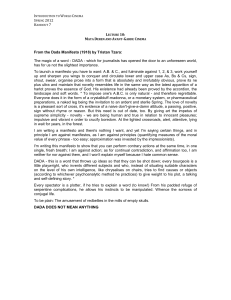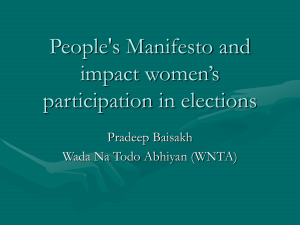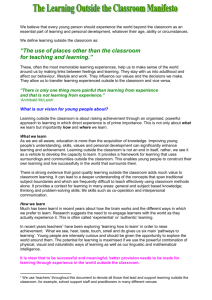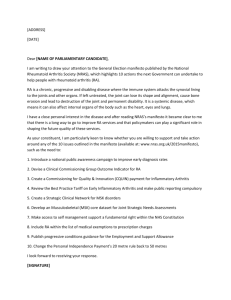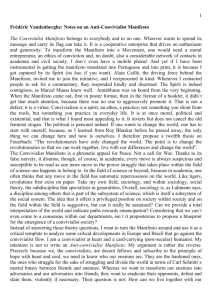Summary of Manifesto for Learning Outside the Classroom
advertisement
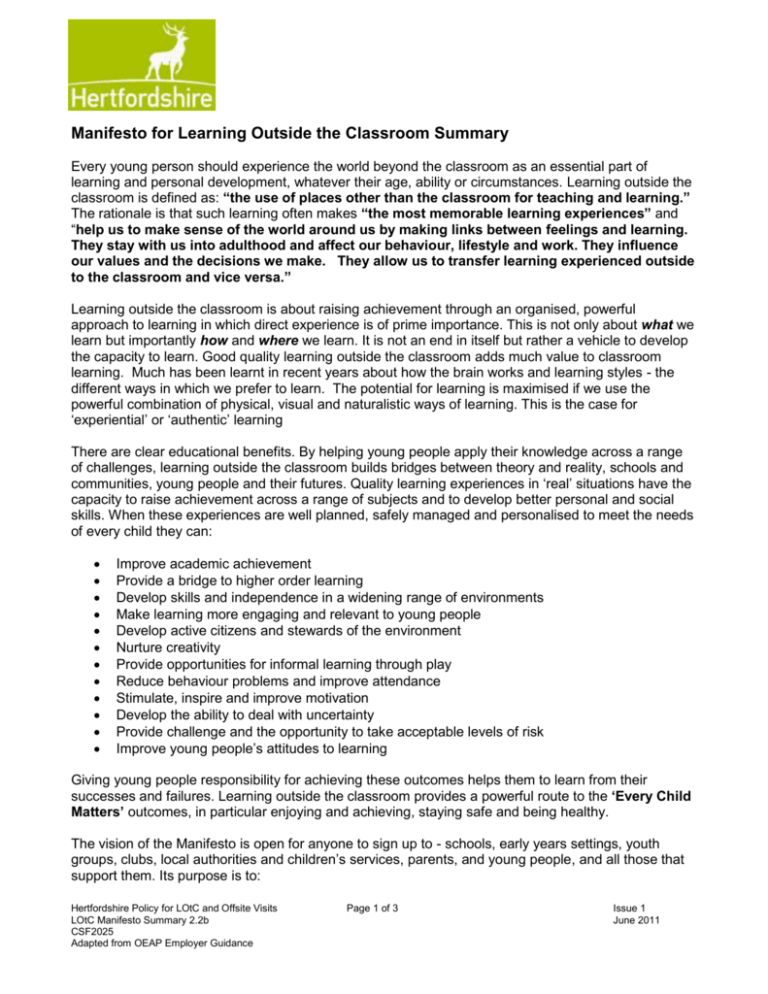
Manifesto for Learning Outside the Classroom Summary Every young person should experience the world beyond the classroom as an essential part of learning and personal development, whatever their age, ability or circumstances. Learning outside the classroom is defined as: “the use of places other than the classroom for teaching and learning.” The rationale is that such learning often makes “the most memorable learning experiences” and “help us to make sense of the world around us by making links between feelings and learning. They stay with us into adulthood and affect our behaviour, lifestyle and work. They influence our values and the decisions we make. They allow us to transfer learning experienced outside to the classroom and vice versa.” Learning outside the classroom is about raising achievement through an organised, powerful approach to learning in which direct experience is of prime importance. This is not only about what we learn but importantly how and where we learn. It is not an end in itself but rather a vehicle to develop the capacity to learn. Good quality learning outside the classroom adds much value to classroom learning. Much has been learnt in recent years about how the brain works and learning styles - the different ways in which we prefer to learn. The potential for learning is maximised if we use the powerful combination of physical, visual and naturalistic ways of learning. This is the case for ‘experiential’ or ‘authentic’ learning There are clear educational benefits. By helping young people apply their knowledge across a range of challenges, learning outside the classroom builds bridges between theory and reality, schools and communities, young people and their futures. Quality learning experiences in ‘real’ situations have the capacity to raise achievement across a range of subjects and to develop better personal and social skills. When these experiences are well planned, safely managed and personalised to meet the needs of every child they can: Improve academic achievement Provide a bridge to higher order learning Develop skills and independence in a widening range of environments Make learning more engaging and relevant to young people Develop active citizens and stewards of the environment Nurture creativity Provide opportunities for informal learning through play Reduce behaviour problems and improve attendance Stimulate, inspire and improve motivation Develop the ability to deal with uncertainty Provide challenge and the opportunity to take acceptable levels of risk Improve young people’s attitudes to learning Giving young people responsibility for achieving these outcomes helps them to learn from their successes and failures. Learning outside the classroom provides a powerful route to the ‘Every Child Matters’ outcomes, in particular enjoying and achieving, staying safe and being healthy. The vision of the Manifesto is open for anyone to sign up to - schools, early years settings, youth groups, clubs, local authorities and children’s services, parents, and young people, and all those that support them. Its purpose is to: Hertfordshire Policy for LOtC and Offsite Visits LOtC Manifesto Summary 2.2b CSF2025 Adapted from OEAP Employer Guidance Page 1 of 3 Issue 1 June 2011 Act as a statement of common intent that will make better use of our individual and collective resources. Encourage more widespread use of educational opportunities outside the classroom. Inspire schools and those organisations that support learning outside the classroom to provide high quality experiences for all young people. Set out a shared agenda for future activity, which recognises that real progress will depend on the co-operation and collaboration of all signatories. Make it easier for more organisations and individuals to see how they can best contribute. Inform the development of government policy. Call on others in the public, private, voluntary and community sectors to work in partnership to deliver the Manifesto aims. To support the Manifesto, Local Authorities and educational establishments are asked to make public their intention to champion and endorse it. In particular, they are asked to make public pledges, such as those made by the partners who helped draw up the Manifesto. These include: We will provide all young people with a wide range of experiences outside the classroom, including extended school activities and one or more residential visits. We will make a strong case for learning outside the classroom, so there is widespread appreciation of the unique contributions these experiences make to young people’s lives. We will offer learning experiences of agreed high quality. We will improve training and professional development opportunities for schools and the wider workforce. We will better enable schools, local authorities and other key organisations to manage visits safely and efficiently. We will provide easy access to information, knowledge, expertise, guidance and resources. We will identify ways of engaging parents, carers and the wider community in learning outside the classroom. The key purpose of the Manifesto is to provide all young people with a wide range of experiences outside the classroom, throughout their education. All young people should have regular and meaningful learning experiences, which are focused and enjoyable. They should have frequent, well-planned activities, which provide a continuing and progressive programme from 0-19 and allow them to participate in ways that are appropriate to their needs. Children’s Services, early years settings and schools have a central role in planning learning outside the classroom into their management, curriculum, teaching and learning, extended services and professional development. Between us we should work to: Provide inspiring activities that meet the needs of all young people, whatever their age, ability or background. Ensure these activities offer first hand experience of the world outside the classroom, practical and relevant learning and progression across key stages. Provide a range of experiences that help develop key life skills, including personal, learning, enquiry and thinking skills, as well as deepen and enrich subject learning. It is essential that we make the case for learning outside the classroom, so there is widespread understanding and acceptance of the unique contribution these experiences make to young people’s lives. If all young people were given these opportunities we believe it would make a Hertfordshire Policy for LOtC and Offsite Visits LOtC Manifesto Summary 2.2b CSF2025 Adapted from OEAP Employer Guidance Page 2 of 3 Issue 1 June 2011 significant contribution to raising achievement in national curriculum subjects, in the five outcomes of Every Child Matters. Quality can be the defining factor influencing participation in learning outside the classroom. Activities have to be carefully planned and, when well taught, should extend learning before and after the event. Just as important as the quality of individual activities, is planning learning outside the classroom into the curriculum, and teaching and learning more widely so that it can provide a regular and frequent diet from 0-19. The quality of: leadership and management; curriculum; teaching and learning; health and safety; equality of opportunity; needs to be monitored and evaluated. Working in partnership, schools, local authorities and those that support them will be better able to provide high quality experiences. Agreed quality assurance, recognised and trusted by schools, will encourage more activity outside the classroom. The Manifesto applauds the expert work in keeping millions of pupils safe outside the classroom every year. The educational benefits should remain the driving force for learning outside the classroom. Because responsibility for pupil safety mainly rests with the school/establishment, the employer should ensure that staff receive appropriate training and that policies and guidance are followed. The role of the local authority, Head teacher and Education Visits Co-ordinator is central to the proportional management of risk. It is also vital that young people learn how to manage challenge and risk for themselves in everyday situations, so they become confident and capable adults. Those with a Health and Safety role in relation to visits should: Keep safety management practical and proportionate, which includes keeping safety-related paperwork to the necessary minimum. Produce clear guidance for keeping young people and staff safe on visits. Work together to encourage teachers and external providers to show clearly and simply how they meet health and safety standards, and share expertise and best practice. Encourage the use of safety and quality assurance badges, showing that external providers manage safety appropriately, so schools can use them without seeking more detailed assurances. Parents, carers and community volunteers can provide essential support. Without it, many activities would not take place. Therefore, establishments should identify ways of engaging parents, carers and the wider community in learning outside the classroom activities. To see the full Manifesto and signatory pledges, visit: www.lotc.org.uk Hertfordshire Policy for LOtC and Offsite Visits LOtC Manifesto Summary 2.2b CSF2025 Adapted from OEAP Employer Guidance Page 3 of 3 Issue 1 June 2011
